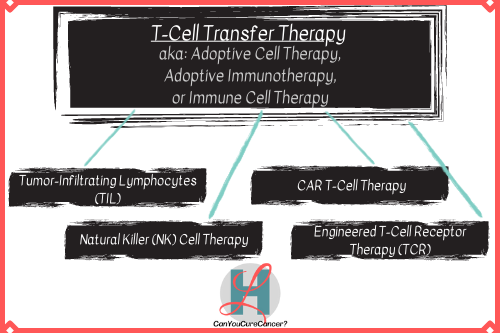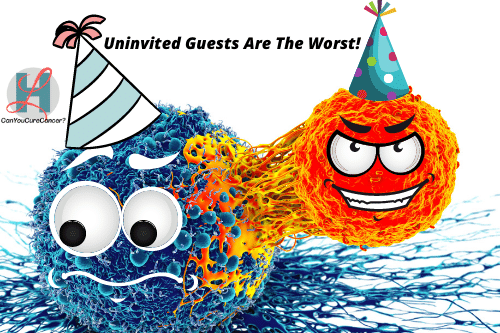Whether you saw a commercial on television, or your doctor mentioned it at your last visit, if you’re looking for information on immunotherapy, you’re in the right place.
When my husband, Barry, and I heard the term immunotherapy for the first time, after his cancer diagnosis, we were thrilled because it sounded like a treatment that was going to help boost his body’s natural defense system; rather than damage both the healthy and unhealthy cells without discrimination (like many other cancer treatments).
Immunotherapy is an interesting form of treatment for so many reasons! As with absolutely any treatment you may choose to undergo, the results vary drastically from person to person. This will be no exception, so this is our story of how immunotherapy left its mark on our life. I’m not advising, or suggesting anything, just telling our story. Speak to your doctor for how/if immunotherapy may benefit your cancer diagnosis. You can find my full disclaimer here.
Immunotherapy: The Science & Types Of Immunotherapy
Immunotherapy is a treatment option for some cancers. The National Cancer Institute (NCI) defines immunotherapy as a type of therapy that uses substances {cytokines, vaccines, bacillus Calmette-Guerin (BCG), or monoclonal antibodies} to stimulate, or suppress, the immune system to help it battle cancer, infection and some other diseases.
So I’ve altered that definition into my own words above, but the gist is that you’re trying to affect the body’s own immune system to fight off cancer, by either targeting specific cells, or the entire immune system; in a more broad way.
The amount of information I could provide you with on immunotherapy seems to be endless and also more technical than was intended with this particular blog. For the sake of keeping this blog more about our experience with immunotherapy, I’m going to generalize as much as possible and zip through some basic information about immunotherapy. If you’re looking for more specifics on a particular type of immunotherapy, check out the further reading section at the end of this article.
Nonspecific Immune Stimulation
As I said before, we had the impression when Barry started immunotherapy, that it was a process of ramping up his body’s own immune system and this is true of some types of immunotherapy treatment, such as nonspecific immune stimulation. Per the NCI, the BCG I mentioned before, sometimes will be added even after all of your cancer has been surgically removed, to keep it at bay; by killing any cancer cells that may be straggling behind.
T-Cell Transfer Therapy
T-Cell Transfer Therapy, also known as Adoptive Cell Therapy, is something a little different, which involves using your body’s T-Cells. T-cells (a type of white blood cell) are a part of the immune system that focuses on specific foreign invaders (antigens). Now imagine if you could remove those T-cells from your body, give your T-Cells a boost by augmenting them to target your cancer cells and then let them loose back in your body!1

You could further divide T-Cell Transfer Therapy into Tumor-Infiltrating Lymphocyte Therapy, Engineered T-Cell Receptor Therapy, Natural Killer Cell Therapy and CAR T-Cell Therapy.1
Immune Checkpoint Inhibitors
Another immunotherapy possibility, is immune checkpoint inhibitors. This is what my husband had. One of the functions of our body’s immune system is to rid it of cancer cells that may occur. Cancer is smart and tries to be sneaky to achieve its goal of survival and conquering your body. A checkpoint’s typical job is keeping your t-cells in check, until a time when they are needed. Cancer (because it’s a nasty life sucker) will try to keep your t-cells in an off position.

My husband’s cancer was advanced and although we saw immunotherapy as a giant opportunity, we were fighting an uphill battle. While your doctor may be having to consider things like cytokine release syndrome (CRS) -(a side effect of some forms of immunotherapy that can cause an array of dangerous side effects), we were just hoping to save his life and didn’t have to weigh in potentially, functionally debilitating side effects as much. More on this later.

The immune system in your body is responsible for many things, included in that is ridding the body of abnormal cells such as cancer cells. I will never forget how terrifying it was having to fight cancer in the middle of the the peak Covid-19 pandemic and worrying that if Barry got Covid, he wouldn’t be able to have enough immune system to go around!
Immunotherapy Medications
This is not an area where you will likely get many choices. It’s more likely that your doctor will present you with the one, or two, medications you will take that are the best fit for your particular type of genetic marker (again assuming it’s appropriate for your cancer diagnosis at all).
Barry had an advanced melanoma that had attacked only his Central Nervous System. They looked at his genetics and what markers he had and made the decision that he should have Ipilimumab (Yervoy) and Nivolumab (Opdivo).1
The medical staff that worked with us referred to the medications as Ipi and Nivo for short. They joked with him when he was in his treatment chair that he must have been pretty special to be receiving the Cadillac of immunotherapy drugs. I’m not sure my husband, with all of the consequences of these drugs, would agree, but in the absence of them we knew what we were facing.

What are these drugs? They fall into different classes, or categories, but perhaps the best place to start is by going back to where I left off, with immune checkpoint inhibitors; one of the types of immunotherapy named above.
To better explain how immune checkpoint inhibitor treatments work, let me explain how those checkpoints function.
Viruses, or bacteria, enter your body and your immune system attacks. In order to make your immune system capable of distinguishing between your body’s healthy cells and the cancer cells, it utilizes checkpoints like brakes. This keeps your body from attacking its own healthy cells. What happens if that’s turned off? Havoc! Cancer is nasty and they sit there flipping these checkpoints on, or off, at will like a light switch to hide themselves!
This makes me wonder… we ponder why some people die of Covid-19 and others seem somewhat unaffected. What if there was an underlying cancer diagnosis that was to blame rendering their checkpoints useless and allowing the virus to do far more damage than it should have been able to? I digress.
Immune Checkpoint Inhibitors are drugs that take the brakes off. At the moment, eight of these drugs have been approved for cancer, but I have no doubt that number will grow.1
Let’s talk about what happens when you take the brakes off. Hopefully cancer destruction, but also quite likely immunotherapy side effects. This is an unfortunate consequence of having to release the brakes and let the immune system run wild. So what can this mean and what kind of side effects can be expected? That really depends on what Immune Checkpoint Inhibitor, or other form of immunotherapy you receive.
In all cases, you are exposing yourself to the risk of your healthy tissue being harmed by your amazingly strong immune system. I remember being excited when his system got attacked (sounds odd I know), because we figured if it was attacking his body’s healthy tissues, than it must be attacking the cancer! I also remember being nervous about giving Barry anything that is immune boosting during the time he was receiving these treatments, out of fear that his immune system was already on overdrive.
Doctors/Pharmacists never gave us a solid answer as to whether we should pause on any supplements for this reason, but I always wondered about the implications. If you have an autoimmune disorder (a disease where your body already has a hyperactive immune system that’s attacking healthy cells) you need to make sure that you were thorough on your intake and your doctor is fully aware of your diagnosis as you move forward with checkpoint inhibitors. Sign up if you want me to send you more free tips on preparing for your doctor’s visits.
How do Checkpoint inhibitors work? They block proteins (PD-1, PD-L1, CTLA-4, TF). Each drug inhibits a different protein. They block these proteins on the immune cell’s surface, allowing the cells to go after the cancer.1 I just wanted to mention this in case during a visit the doctor talks about a PD-1 inhibitor, now you’ll know what that means. ‘Nivo’ happens to be one of those PD-1 inhibitors, but so are a couple of the other drugs available.
Immunotherapy Side Effects
So immunotherapy side effects were interesting for my husband. He had pretty much all of them! With each treatment we tried this was the case for him, because of the location of his cancer. His cancer was throughout his brain and spine, so anything controlled by his brain or spine was potentially attacked as the cancer was attacked. Just to be clear, that’s everything.
Each immunotherapy drug carries its own list of potential side effects, so check with your pharmacist and doctor about what you may expect.
Side effects related to some types of immunotherapy are often related to the effect of your immune system attacking itself. This means any autoimmune disorder symptoms could pop up. So just like the immune system attacks cancer, it targets normal healthy cells resulting in inflammation. This can result in, but certainly not limited to:
- Skin issues/rashes2
- Colitis, Diarrhea2 (This one can be tricky because if you’re taking other constipating medications you may not realize you have this, so just report any changes)
- Muscle pain2
- Arthritis2
- Loss of Appetite3
- Breathing issues2
- Cough2
- CIADM2– Like Type 1 Diabetes, but related to checkpoint inhibitors, so diabetes-like symptoms
- Lab work may reveal lowered blood counts/anemia2
Again, this gets complicated, because many of these are also piled into the list of potential CRS symptoms, which is considered a severe side effect of immunotherapy. So, for example, if you’re experiencing fatigue, that could be a mild immunotherapy side effect, or it could be a sign of a more serious side effect-CRS, or it could be the lack of sleep you’re getting at night due to a terrifying cancer diagnosis! You pick. Or better yet, let your doctor decide.
We can’t talk about Immunotherapy side effects without rounding back to CRS in more depth. This is a term that your care team will be throwing around and watching your labs for signs of, whether you’re aware of it, or not.
So if you have CRS, what labs may be off, or what might they be showing?
- A high c-reactive protein test (measuring how much c-reactive protein is in the blood, which is a protein made by the liver that goes to the bloodstream in response to inflammation).4
- Creatinine and liver enzymes may be elevated.4 Knowing what I know about creatinine, I imagine this is because creatinine levels can rise when there is kidney damage, but that’s just my assumption. Similarly, liver enzymes can be elevated in the blood when there is liver damage. (What can get confusing is that strenuous exercise and other factors can also affect these levels). If your labs come back off, don’t assume the worst ie: your kidneys have failed, just see what your doctor says and what can be done to get these numbers back in line.
- Cytopenia.4 (Your care team will be on the lookout for a decreased number of blood cells). In general, the auto-immune like symptoms that can be caused by immune checkpoint inhibitors, can be grouped into something they call immune related adverse events (ir-AE’s). This can effect any organ, but less frequently the hematological (blood) system4 …however! We’re talking about CRS here and it’s kind of like all bets are off.
- Deranged coagulation parameters.4 Big words, basically means abnormal situations with blood clotting in my understanding. Always consult with your doctor for a better description of what they may be looking for with testing. This seems to be greater cause for concern with CAR T-cell therapy. CAR-T induced coagulation abnormalities is blamed for multiple organ dysfunctions.5
On the list of mild symptoms that may pop up with CRS (certainly not all encompassing):
- Flu-like symptoms with mild fever4
- fatigue4
- Headache4
- Rash4
- Cough/Trouble Breathing4
- Arthralgia4 (stiff joints)
- Myalgia4 (muscle aches/pains)
- Tachycardia5 (rapid heart rate)
- Tachypnea5 (rapid breathing)
- Hypotension5 (low blood pressure)

Is Immunotherapy Worth It ?
So if you’re starting to think the list sounds like more than you want to sign up for, just keep thinking about the alternative. Plus research is showing that some of the more severe side effects such as the hematologic effects (having to do with the blood) are less likely with immunotherapy than with classic cytotoxic chemotherapy.6
I will be the first to tell you that this is a brief explanation of a lot of topics that all deserve their own extensive blog. Immunotherapy is an ever-changing and growing field that should excite you!
It can sound scary, but that’s why I wrote this, to start putting things into terms that begin to make sense and tell you what it looks like from a patient’s/family’s point of view. Also, knowledge is power here for you and your practitioners. Some of the symptoms listed above, take cytopenia for example, can be life threatening and early patient management of the symptom can prevent it from becoming fatal.7 So report symptoms and ask questions.
One of the more severe side effects (because I didn’t really expand on the more severe potential problems here, besides CRS) is neurological toxicities.4 If you have a cancer affecting your neurological system, you can imagine the difficulty this poses. This is a real problem for many people and it was the hardest part of our experience.
Is it the tumors, or is it the treatment? A constant question we were always pondering. Side effects can mimic disease process in many cases, but when dealing with neurological problems, this can pose a real challenge in treatment.
We had weeks when Barry received a substantial dosage of these extremely expensive immunotherapy drugs, just to turn around and have to go back to the hospital for a blood transfusion and high dose of steroids. It was a constant battle between treatment and then putting on the brakes and giving him a counter treatment (the steroids) to try to save his function.
He lost the ability to walk, have full control over his bodily functions, until eventually his breathing, swallowing, speech… it was all lost.
This is not the norm, again, our experience was with a melanoma in his brain and spine and it was already very advanced. We had to fight with our own inner battles of wanting this potentially life saving treatment and knowing that for him, as the treatment worked, he would also lose more function and risk his life! The good news is that they had something to counter the immunotherapy with, if it was needed. More like pumping the brakes than reversing the treatment, but still helpful.
Yes, things can go wrong. In the absence of treatment things can go worse. Also at times plans need to change and stay flexible. Only you and your practitioners can come to the right choice for your care.
One Final Immunotherapy Highlight- Looking Promising
This may still be in clinical trials only (again I refer you to ask your doctor), but it’s too exciting to not at least mention as something on the horizon. My research started with a company called Amgen.
Bispecific T-cell engaging (BiTE) is something that was never mentioned as an option for us, potentially because it wasn’t out of clinical trials yet, or Barry wasn’t a good candidate.
So remember how I was talking about how annoyingly smart cancer is getting? It sounds like we’re finding new ways to fight back!
Cytotoxic T-cells fight cancer. They use antigen recognition to do so, but cancer cells are forming mechanisms to evade T-cell recognition (getting better at dodging).

Cancer escape methods are a problem. Amgen explains that BiTE works without the need for T-cell recognition mechanisms! T-cells are brought to cancer cells to make the connection. This happens by binding an antigen on tumor cells and a surface molecule on T-cells.8
I know that’s a little technical, but what’s important here is that we are finding our way towards countering cancer’s sneaky dodging.
Best of all, one of the focuses of BiTE is to prevent the occurrence of severe CRS!4
I’ll leave you with this- Immunotherapy is not without it’s down side. I mean this is cancer we’re talking about so buckle up! Immunotherapy, however, is something that I wish in hindsight we had started sooner, because I think that it holds real promise, especially when given the best environment to do so. Communication with your healthcare team is the best way to get the most from this treatment, with the least harm to your body.
Further Reading
CanYouCureCancer?: Cancer is Terrifying! Causes of Cancer & 3 Important Ways to Change Course
Amgen: BiTE Immuno-Oncology Platform
National Cancer Institute: T-Cell Transfer Therapy
WebMD: Types of Immunotherapy
References
1 Watson, S. Types of Immunotherapy. WebMD.com. Medically Reviewed by Michael W. Smith, MD on January 11, 2021. Accessed October 26, 2021.
2 Cancer.Net Editorial Board Approved. Side Effects of Immunotherapy. Cancer.Net. 5/2019. Content Updated 11/1/2021. Accessed November 9, 2021.
3 Luke, J. : Reviewed by. Immunomodulators: Checkpoint Inhibitors, Cytokines, Agonists, and Adjuvants. Cancer Research Institute. Updated January 2020.
4 Shimabukuro-Vornhagen A, Gödel P, Subklewe M, et al. Cytokine release syndrome. J Immunother Cancer. 2018;6(1):56. Published 2018 Jun 15. doi:10.1186/s40425-018-0343-9.
5 Mei H, et al. Neurological toxicities and coagulation disorders in the cytokine release syndrome during CAR-T therapy. BJHaem. Volume 181, June 2018; 5: 689-692.
6 Xiaolin Liu, et al. Immune Thrombocytopenia Induced by Immune Checkpoint Inhibitors in Solid Cancer: Case Report and Literature Review. Front. Oncol., 07 December 2020.
7 Calvo R. Hematological Side Effects of Immune Checkpoint Inhibitors: The Example of Immune-Related Thrombocytopenia. Front Pharmacol. 2019;10:454. Published 2019 Apr 26. doi:10.3389/fphar.2019.00454.
8 Zhou, S., Liu, M., Ren, F. et al. The landscape of bispecific T cell engager in cancer treatment. Biomark Res 9, 38 (2021). https://doi.org/10.1186/s40364-021-00294-9

